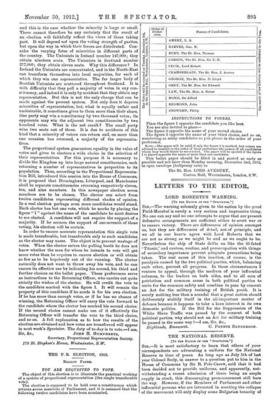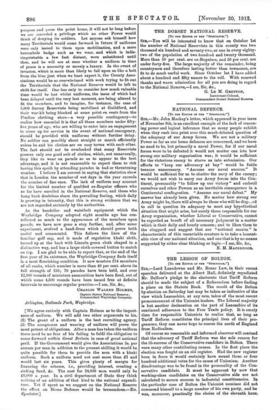THE NATIONAL RESERVE.
[To MI EDITOL OF THE "SPECTATOR:1 Sin,—It 18 most satisfactory to learn that others of your correspondents are advocating a uniform for the National Reserve in time of peace. As long ago as July 5th of last year Colonel Seely, in answer to a question put to him in the House of Commons by Sir R. Pole-Carew, said that it had been decided not to provide uniforms, and apparently, not- withstanding a recent admission of there being an ample supply in stock, this discouraging pronouncement still bars the way. However, if the Members of Parliament and other influential persons who are interested in averting the collapse of the movement will only display some Bulgarian tenacity of purpose and press the point borne, it will not be long before we are Jonceded a privilege which no other Power would think of denying its soldiers. Let anyone ask himself how many Territorials would come forward in future if uniforms were only issued to them upon mobilization, and a mere buttonhole badge such as we wear, and which is indis- tinguishable a few feet distant, were substituted until then, and he will see at once whether a uniform in time of peace is a necessity or merely a luxury. In the event of invasion, which is more than likely to fall upon us like a bolt from the blue just when we least expect it, the County Asso- ciations would be so overwhelmed with work trying to fit out the Territorials that the National Reserve would be left to shift for itself. One has only to consider how much valuable time would be lost whilst uniforms, the issue of which had been delayed until the very last moment, are being altered to fit the members, and to imagine, for instance, the case of 5.000 Surrey Reservists being mobilized at Guildford, and their war-kit being blocked at some point en route from the Pimlico clothing store—a very possible contingency—to realize how essential it is that all those members under fifty- five years of age, who are willing to enter into an engagement to come up for service in the event of national emergency, should be provided with uniforms without further delay. No soldier can possibly shoot straight or march efficiently unless he and his clothes are on easy terms with each other. The fact should not be overlooked that many Reservists possess only one good suit of clothes, which, not unnaturally, they like to wear on parade so as to appear to the best advantage, and it is not reasonable to expect them to risk having this spoilt by attending parades in bad or threatening weather. I believe I am correct in saying that statistics show that in London the number of wet days in the year exceeds the number of fine ones. The lack of uniform may account for the limited number of qualified ex-Regular officers who so far have enrolled in the National Reserve, and those who hang back doubtless share the prevailing feeling, which daily is growing in intensity, that this is strong evidence that we are not regarded seriously by the authorities.
As the bandolier and waistbelt equipment which the Weybridge Company adopted eight months ago has con- tributed so much to the appearance of the members upon parade, we have now gone a step further, and, after some experiment, evolved a head-dress which should prove both useful and ornamental. This follows the lines of the familiar golf cap, and is made of regulation khaki cloth, turned up at the back with Lincoln green cloth shaped in a distinctive way, and has a large cloth-covered button to match on top. I am glad to be able to report that, at the end of the first year of its existence, the Weybridge Company finds itself in a most flourishing condition. It now musters 214 members of all ranks, which number is more than 40 per cent, above its full strength of 150; 70 parades have been held, and over 12,500 rounds of miniature ammunition have been fired, out of which some 4,500 rounds have been issued free at defiuite intervals to encourage regular practice.—I am, Sir, &c., CHARLES WALKER HOLMES,
Captain Surrey National Reserve ; Commandant Weybridge Company.
.Arlington, Oatlands Park, Weybridge.
[We agree entirely with Captain Holmes as to the import- ance of uniform. We will add two other arguments to his.
(1) The grant of a uniform is the best recruiting agency.
(2) The acceptance and wearing of uniform will prove the most potent of obligations. After a man has taken the uniform there need be no fear of his failing to fulfil the obligation to come forward within Great Britain in case of great national peril. If the Government would give the Associations 5s. per annum per man in addition to the present shilling it would be quite possible for them to provide the men with a khaki uniform. Such a uniform need not cost more than 21 and would last six years. This gives plenty of margin for financing the scheme, i.e., providing interest, creating a sinking fund, &c. The cost for 24,000 men would only be £6,000 a year. In a civil department of State they think nothing of an addition of that kind to the national expendi- ture. Yet if spent as we suggest on the National Reserve the effect on Home Defence would be tremendous.—En. Spectator.]



















































 Previous page
Previous page